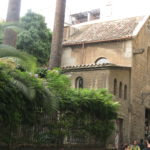This article is part of a series being shared to highlight activist struggles across Europe and grassroots response to health and economic crisis. These articles are shared in preparation for the event ‘Reclaiming the commons: From austerity and debt to public space and health as commons’ which will take place next Wed 27th Jan.
 Common Horizons have spoken with Guillem Capdevila, member of the CAP Raval Nord Digne Platform, of the CDR del Gòtic-Raval and also one of the voices of the Raval Neighbourhood Network (@XarxaVeinalRaval), an organisation created by the neighbours which gathers about twenty entities from the Raval.
Common Horizons have spoken with Guillem Capdevila, member of the CAP Raval Nord Digne Platform, of the CDR del Gòtic-Raval and also one of the voices of the Raval Neighbourhood Network (@XarxaVeinalRaval), an organisation created by the neighbours which gathers about twenty entities from the Raval.
Stories, practices and local experiences
Old disused church in the heart of the Raval, in the center of Barcelona. Residents had identified the building as a suitable location for a public neighbourhood medical clinic. However there was a political struggle over the use of the building between the residents and MACBA which is a huge art gallery and cultural institution. Fundación MACBA is a private non-profit organisation and forms part, together with Barcelona City Council, the Government of Catalonia and the Ministry of Culture, of the MACBA Consortium, the museum’s governing body.
Audio interview in Spanish:
G.C.: I belong to the Plataforma Cap Raval Nord Digne formed by neighbours and workers of the primary care medical centre (CAP), which was declared obsolete 13 years ago because it has many structural problems (access, humidity,…), the conditions of the centre are not optimal.
Strategies from a commons approach (opportunities)
Residents occupied the Capella in protest in 2019. They finally reached an agreement with the town hall to locate the clinic in the space of the old chapel.
This is an interesting local example of citizens demanding the use of urban space, organising an occupation as a political action and strategy to raise awareness of the need for public health services.
G.C.: Our experience has been to create synergies between CAP workers and the residents of the neighbourhood. Networks and organizations were called upon to be present at open assemblies, it is a neighborhood with a population of very diverse origins, we tried to reach everyone, to reach people who are normally not so committed, because of the language, etc. Around 37,000 people live in the neighbourhood.
We collected signatures to draw the attention of the town council to the issue, because the physical space that had been chosen, the Capella de la Misericordia had been given to the MACBA but for 5 years nothing had been done, the residents were asking to occupy the Capella, to force the institutions to respond.
The alliances have been with many organisations and groups in the neighbourhood and with unions and groups that promote health at all levels.
Problems and challenges
G.C.: Disinformation, misleading information from the media or the administration… the challenge has been to reach everyone in the neighbourhood and in the city. The information that came from the Macba had a consistent tone, they said that it had been decided that the CAP was going to be built in this or that place, and the neighbours came and said “ah, it’s finally been resolved” and you “no, it’s just a proposal that has not been decided” were misleading.
Open questions and outstanding issues
G.C.: To improve and increase the means of participation and the decision-making process in the neighbourhood and the city.
We recommend the documentary: To Green Or Not To Green: Four stories of urban (in)justice in Barcelona (in Spanish and subtitled in English)
Leave a Reply